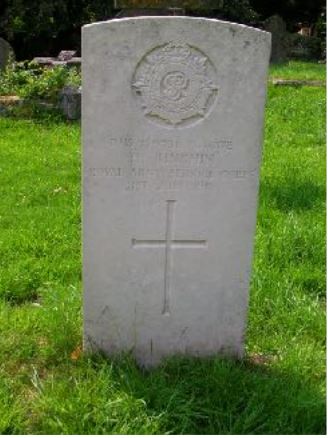Army Service Corps (Motor Transport)

Henry Kinchin was a country boy, who moved to Birmingham and volunteered for military service in his mature years.
He was born in Mickleton, Gloucestershire in 1871, the son of William Kinchin (1849-1925), a shepherd and his wife Mary (née Hall; 1849-1932) and was one of their nine children.
After leaving school he became a labourer and at the time of the 1891 Census was living at the family home in Mickleton. It has not proved possible to locate him in the 1901 Census but evidence suggests that he had moved to Birmingham by this time.
On 6 August 1901 he married Birmingham born Minnie Elizabeth Acton (1878-1949) at Aston, Birmingham, Registry Office. She was pregnant with a son, Lawrence Henry, born on 13 October of that year. They had a further child, a daughter, Hilda Mary, on 20 December 1902. At the time of the 1911 Census Henry, Minnie and children lived at 95 Aston Brook Street, Birmingham and Henry was employed by the city corporation as a gardener at a recreation ground.
Unusually, a least some documentation from Henry’s Army Service and Pension Records has survived. These show that he volunteered to serve in the Army for the duration of the war, signing on at the Recruiting Office, James Watt Street, Birmingham, on 13 September 1915. He gave his address as 131 Phillip Street, Aston but this was amended to number 206. His stated age was 44 years and 360 days; his occupation as a gardener and that he had no previous military service.
He was very soon in uniform and reported to the Army Service Corps (ASC) camp at Osterley Park, Isleworth, west London on 18 September. By 13 November 1915 he had gained a Motor Leavers Test Certificate A and became a Driver within the ASC’s Motor Transport (MT) section.
He spent all his time in the Army in the UK, possibly transferring to Bulford Camp, Wiltshire at some point. He served until 30 August 1917, when he was discharged from the Army as ‘no longer physically fit for war service’. He was suffering from myalgia (or muscle pain) and also had dental problems. A medical board noted that his problem had originated back in 1907 and had been aggravated by military service. He had a record of very good conduct and was considered sober, industrious, reliable and intelligent and a competent motor driver. He was granted a small pension and awarded a Silver War Badge, to confirm discharge from Army service.
The pension was no doubt reviewable annually and at a medical board convened on 29 July 1918 a 20% disability pension for rheumatism was awarded but (the board noted, ‘at present is totally incapacitated (as stated above)’. The papers relating to the total incapacity do not appear in the pension file.
Private Henry Kinchin died on 31 July 1918, aged 47. A recently released Pension Record Card gives the cause of death as ‘carcinoma of the descending colon’. This was almost certainly the reason for the total incapacity referred to above.
He was returned to his home village of Mickleton, to be buried in the churchyard of St Lawrence, where a standard CWGC headstone marks his grave. He is commemorated in the Mickleton War Memorial.
Researched by Graham Adams 30 September 2020
